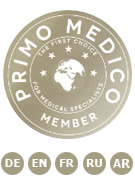Meningeomas
These tumors which usually does not metastasize develops from the membranes enveloping the brain (meninges). It grows between the skull bones and the surface of the brain, slowly displacing the brain volume. It can infiltrate the skull bones and the surrounding muscle tissues. Depending on the situation and size of the meningioma, it can cause symptoms such as intense headaches, epileptic seizures, brain deficiencies, consciousness disorder, paralysis and other neurological impairments. If the complete surgical removal of the tumor is not possible, radiation therapy could be indicated. Proton therapy is often appropriate for treating especially atypical (WHO Grade II) and malignant meningiomas (WHO Grad III) because a much higher dose is necessary than for the WHO Grade I meningiomas. Proton therapy enables a very precise spatial modulation of the radiation dose in the vicinity of sensitive structures, such as optical nerves.
Low-grade glioma of the brain and spinal cord
These usually develop from glial cells, the supporting tissues of the brain. The closer these cells still resemble their source cells, the better the chances of the treatment’s success. In these cases, the tumors are classified as grade 1 and grade 2. According to the current stand of scientific knowledge, if a tumor has developed further away from its source cells – we call this dedifferentiation – proton therapy does not offer any better level of tumor control than modern photon irradiation with a linear accelerator. This is why grades 3 and 4 brain tumors, as well as glioblastoma multiforme, are not currently included in the PSI medical program.
Head & Neck Tumors
Tumors of the ears, nose and throat areas (ENT tumors) often grow in close proximity to the sensitive structures of the brain, skull base and spine and require precise and sometimes large volume irradiation. Proton therapy lends itself very well for the treatment of these tumors; usually adenoid cystic carcinomas (ACC), benign and malignant parotid tumors, as well as nasopharynx tumors of different tumor tissue types.
Sarcomas
Sarcomas are malignant cancers of the connective and supportive tissues. They can develop in all regions of the human body, for example in the pelvis, spine or in other bones and joints, as well as in muscle tissue. It requires a very high dose of radiation to treat them. For tumors of the so-called soft tissue sarcoma type and diagnosed as inoperable or removable only through radical surgery which will result in a great loss of bodily function, PSI offers a course of pre-operative or definitive proton therapy in combination with hyperthermia therapy under the leadership of the Radio-Oncology Department of the Cantonal Hospital in Aarau.
Chondrosarcoma and chordoma of the skull base and spinal cord
This form of tumor develops in bone or connective tissues, or both. It grows slowly and metastasizes rarely, but destroys the usually sensitive and often vital neighboring structures.
Pediatric Tumors
Since 2004 PSI has specialized in treating infants and small children. In collaboration with the Anesthesia Team of the Children’s Hospital of Zürich, children between the ages of one and nine years are treated under sedation. The tumors are located in the head or torso. The largest groups of treated tumors were ependymoma, rhabdomyosarcoma, craniopharyngioma, medulloblastoma und Ewing’s sarcoma. These and other, more seldom tumors were often treated in combination with chemotherapy. At PSI almost all the children and adolescents are treated within the framework of a study or according to a study protocol. Children, adolescents and young people can especially profit from the precise application of the radiation dose within the tumor and only low dose to the tissues outside of the targeted volume. This means that the growing and very sensitive juvenile organism is much better shielded in comparison to photon therapy, thereby lowering the probability of subsequent secondary tumors.

